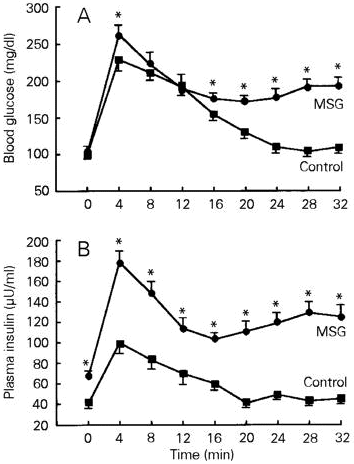Different levels of insulin sensitivity have been described in several animal models of obesity as well as in humans. Monosodium glutamate (MSG)-obese mice were considered not to be insulin resistant from data obtained in oral glucose tolerance tests. To reevaluate insulin resistance by the intravenous glucose tolerance test (IVGTT) and by the clamp technique, newborn male Wistar rats (N = 20) were injected 5 times, every other day, with 4 g/kg MSG (N = 10) or saline (control; N = 10) during the first 10 days of age. At 3 months, the IVGTT was performed by injecting glucose (0.75 g/kg) through the jugular vein into freely moving rats. During euglycemic clamping plasma insulin levels were increased by infusing 3 mU . kg-1 . min-1 of regular insulin until a steady-state plateau was achieved. The basal blood glucose concentration did not differ between the two experimental groups. After the glucose load, increased values of glycemia (P<0.001) in MSG-obese rats occurred at minute 4 and from minute 16 to minute 32. These results indicate impaired glucose tolerance. Basal plasma insulin levels were 39.9 ± 4 µU/ml in control and 66.4 ± 5.3 µU/ml in MSG-obese rats. The mean post-glucose area increase of insulin was 111% higher in MSG-obese than in control rats. When insulinemia was clamped at 102 or 133 µU/ml in control and MSG rats, respectively, the corresponding glucose infusion rate necessary to maintain euglycemia was 17.3 ± 0.8 mg . kg-1 . min-1 for control rats while 2.1 ± 0.3 mg . kg-1 . min-1 was sufficient for MSG-obese rats. The 2-h integrated area for total glucose metabolized, in mg . min . dl-1, was 13.7 ± 2.3 vs 3.3 ± 0.5 for control and MSG rats, respectively. These data demonstrate that MSG-obese rats develop insulin resistance to peripheral glucose uptake
monosodium glutamate; insulin resistance; obesity; clamp technique



